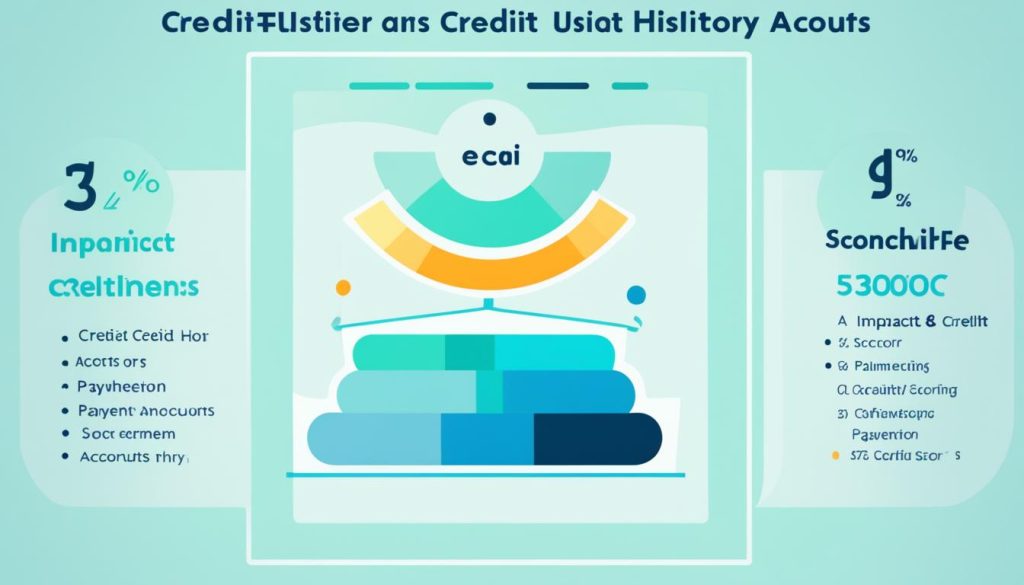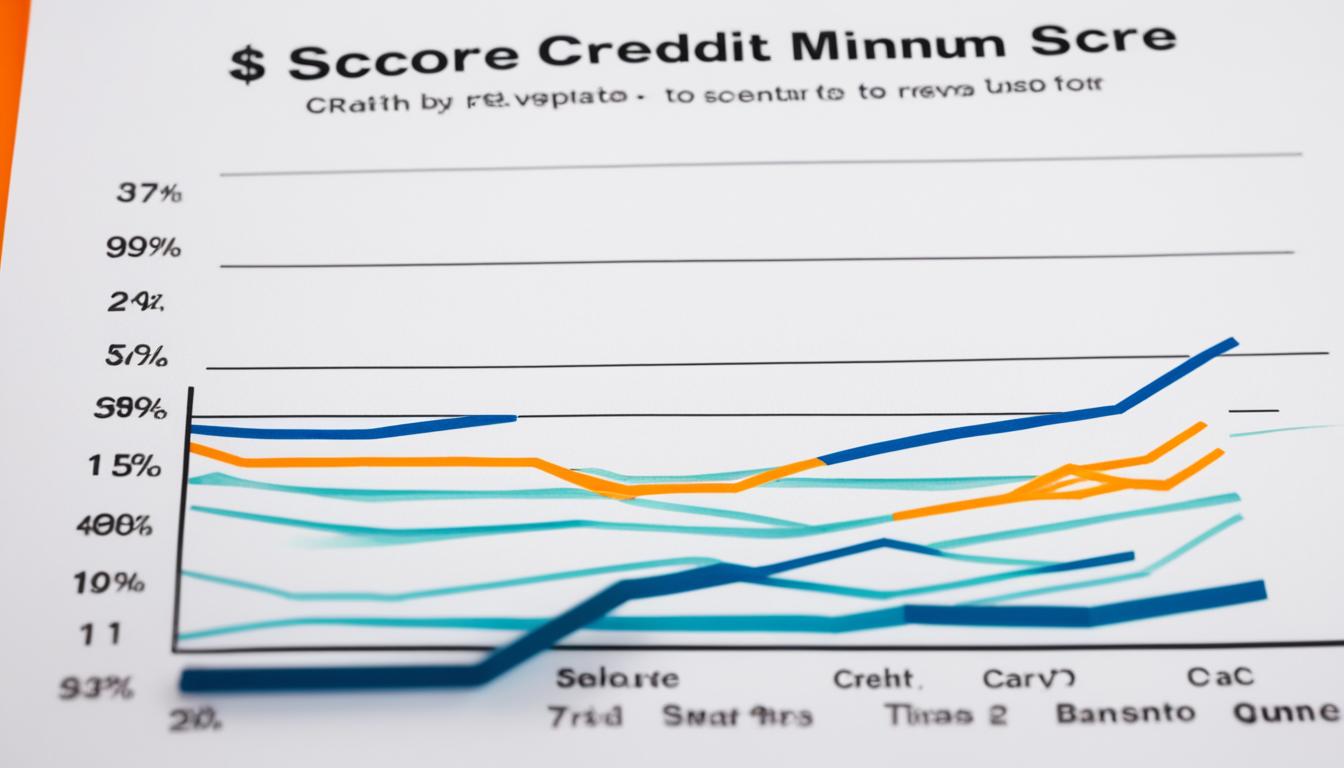Building good credit is vital for achieving financial milestones like renting an apartment, buying a car, or getting a mortgage. To qualify for an Earnest loan, it’s important to understand the minimum credit score requirements and how to build your credit. According to experts, even if your credit score is lower, there are strategies you can follow to improve it quickly.
Key Takeaways:
- Understanding minimum credit score requirements is essential for qualifying for an Earnest loan.
- Building good credit is crucial for achieving financial milestones.
- Lower credit scores can be improved quickly through proven strategies.
- Improving your credit score increases your chances of loan approval.
- Earnest loan eligibility depends on meeting specific credit score thresholds.
It’s important to be aware of the minimum credit score required to qualify for an Earnest loan, as it directly impacts your eligibility. By taking the time to understand the basics and implementing effective credit improvement strategies, you can increase your chances of loan approval and financial success. Let’s explore how you can improve your credit score and ultimately qualify for an Earnest loan.
How to Improve Your Credit Score and Qualify for an Earnest Loan
To improve your credit score and increase your chances of qualifying for an Earnest loan, you can follow several strategies:
- Pay credit card balances strategically to maintain a low credit utilization ratio. This means paying off your balances in full or keeping them below 30% of your credit limit.
- Ask for higher credit limits to lower your credit utilization. By increasing your credit limit, your existing balances will make up a smaller percentage of your available credit.
- Become an authorized user on a credit card with a good payment history. This can help boost your credit score by adding positive payment history to your credit report.
- Pay your bills on time to establish a positive payment history. Late payments can have a negative impact on your credit score, so it’s important to make your payments promptly.
- Dispute any errors on your credit report. Mistakes on your credit report can lower your score, so review your report regularly and notify the credit bureaus of any inaccuracies.
- Consider using a secured credit card to build or rebuild credit. A secured credit card requires a cash deposit as collateral and can help you demonstrate responsible credit behavior.
By implementing these credit score improvement strategies, you can take proactive steps towards improving your credit and increasing your eligibility for an Earnest loan.
“Improving your credit score is a process that requires patience and discipline. Focus on developing healthy credit habits, and over time, you’ll see positive results.”
Implementing these strategies can positively impact your credit score by improving your credit utilization, payment history, and overall creditworthiness. It may take time to see significant results, but consistency and persistence will help you qualify for loans and achieve your financial goals.
The Importance of a Good Credit Score for Loan Approval
Having a good credit score is crucial for loan approval. Lenders use credit scores to assess your creditworthiness and determine if you qualify for a loan. The higher your credit score, the more likely you are to be approved, and you may also receive better loan terms, such as lower interest rates and higher borrowing limits.
Understanding the credit requirements and credit score thresholds set by lenders can help you work towards improving your score and qualifying for loans like those offered by Earnest.
Why is a good credit score important for loan approval?
“A good credit score is like a key that unlocks financial opportunities. Lenders see borrowers with high credit scores as less risky, increasing the likelihood of loan approval and better loan terms.”
Lenders rely on credit scores as a measure of creditworthiness. An impressive credit score indicates responsible financial behavior and demonstrates that you can be trusted to repay your debts. It provides lenders with a level of confidence in your ability to meet your loan obligations.
Benefits of a good credit score
- Increased chances of loan approval: A high credit score boosts your chances of loan approval as lenders view you as a reliable borrower.
- Favorable loan terms: With a good credit score, you may enjoy lower interest rates, saving you money over the life of the loan. Additionally, lenders may offer you higher borrowing limits.
- Access to a wider range of loan options: A strong credit score opens up opportunities to explore various loan products, giving you more flexibility in finding the right loan for your needs.

By maintaining a good credit score, you position yourself for improved loan approval outcomes and more favorable loan terms.
Factors That Affect Your Credit Score
When it comes to your credit score, there are several factors that can influence it. Understanding these credit scoring factors can help you make informed decisions and take steps to improve your creditworthiness.
Payment History
Your payment history is the most significant factor affecting your credit score. Lenders want to see that you pay your bills on time and in full. Late payments, missed payments, or defaulting on loans can have a detrimental impact on your credit score.
Credit Age
Credit age refers to the length of time you’ve had credit accounts. Generally, a longer credit history can be seen as more favorable by lenders. It demonstrates your ability to manage credit responsibly over the years. Therefore, it is important to maintain your older credit accounts, even if you don’t use them frequently. Closing old accounts can potentially lower the average age of your credit history and impact your score.
Credit Mix
Your credit mix refers to the types of credit you have, such as credit cards, installment loans, and mortgages. Having a diverse credit mix demonstrates your ability to manage different types of credit responsibly. However, it’s important to note that there is no fixed formula for an ideal credit mix, and it can vary depending on individual circumstances.
Credit Utilization
Credit utilization measures the amount of credit you are using compared to your total available credit limit. It is recommended to keep your credit utilization ratio below 30%. High credit utilization can indicate to lenders that you are relying too heavily on credit and may have difficulty managing your debt, which can negatively impact your credit score.
Recent Credit Accounts
Your recent credit accounts activity can also affect your credit score. Opening multiple new accounts within a short period of time can be seen as a potential risk by lenders. It may indicate that you are taking on a significant amount of new debt, which can impact your ability to repay existing debts.

Understanding these key factors that influence your credit score is crucial for maintaining a healthy credit profile. By managing your payment history, credit age, credit mix, credit utilization, and recent credit accounts responsibly, you can improve your creditworthiness and increase your chances of securing favorable loan terms in the future.
How to Check and Monitor Your Credit Score
Regularly checking and monitoring your credit score plays a vital role in understanding your creditworthiness and keeping track of any changes. By staying informed about your credit score, you can take proactive steps to improve it and ensure accurate reporting.
Many credit card issuers offer free access to credit scores, making it increasingly convenient to stay on top of your financial health. Take advantage of this convenient service provided by credit card issuers and check your credit score regularly.
Additionally, you have the option to obtain free copies of your credit reports from AnnualCreditReport.com. This allows you to review your credit history, check for any errors, and ensure that the information being reported is accurate.
If you prefer an all-in-one solution, consider using services like CreditWise from Capital One. These services provide not only your credit score but also invaluable tools and insights to monitor and track changes in your credit profile.
Monitoring your credit score enables you to identify any errors on your credit reports promptly. It also allows you to track your progress over time and take the necessary steps to improve your score. Whether you’re working towards improving your credit or maintaining a healthy score, regular monitoring is crucial.

Building Credit Without a Credit Card
While credit cards are commonly used to build credit, it’s important to note that there are alternative ways to establish credit without them. One option is to apply for credit-builder loans offered by credit unions. These loans require you to make payments before receiving the funds, and your payment history is reported to the credit bureaus, helping you build credit.
Additionally, making timely payments on other loans, such as mortgages or student loans, can also contribute to building your credit. By consistently fulfilling your financial obligations, you demonstrate your ability to manage credit responsibly and lenders take notice.
Moreover, some credit bureaus offer services that allow you to add rent and utility payments to your credit report, further enhancing your credit history. This means that as long as you’re making your payments on time, you’re actively building your creditworthiness, even without a credit card.
To summarize, if you’re looking to build credit but prefer not to rely on a credit card, credit-builder loans, timely payments on other loans, and the inclusion of rent and utility payments in your credit report can all help you establish a positive credit profile.

Conclusion
Building good credit is a crucial step towards achieving financial success and qualifying for loans like those offered by Earnest. By understanding the minimum credit score requirements, following credit improvement strategies, and practicing good financial habits, you can build your credit and increase your chances of loan approval.
Regularly checking and monitoring your credit score, and exploring alternative ways to build credit, can further support your efforts. Remember, building good credit takes time and consistency, but the long-term benefits are worth the effort.
Whether you aspire to rent an apartment, buy a car, or become a homeowner, a strong credit score can open doors to financial opportunities. Take control of your credit journey by implementing the tips and strategies discussed in this article. Start building a solid credit foundation today that will benefit you in the years to come.




No comments! Be the first commenter?